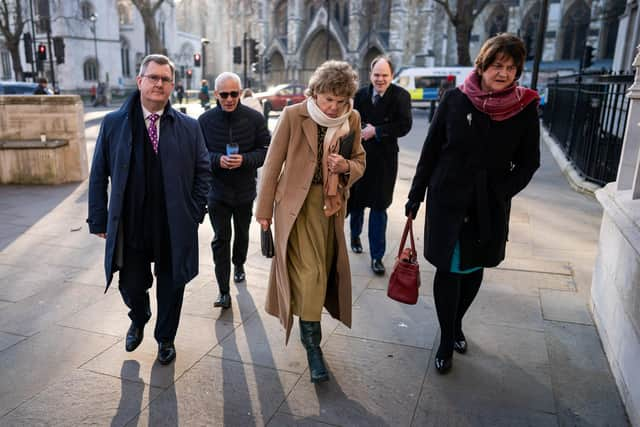Unionists claim vindication despite defeat in Northern Ireland Protocol case: Here are the five applicants in their own words
and live on Freeview channel 276
Jim Allister – one of the six people driving the case – said that the effect of the judgement is to “greatly strengthen our case against the Protocol”, by (among other things) setting out in definitive terms that the Acts of Union 1800 have been partly “suspended”.
UUP MLA Steve Aiken – another one of the group who had launched the case – also said the judgement of the Supreme Court “articulates many of the inconsistencies created by the Protocol”.
Advertisement
Hide AdAdvertisement
Hide AdMeanwhile DUP leader Sir Jeffrey Donaldson said the legal action, whilst it failed, nevertheless “served to highlight some of the reasons why unionists have uniformly rejected the Protocol”.


Following the end of the court case, unionists have sought to stress that the fight against the Protocol will continue in the political realm – with the onus now falling on the UK government to push through legislation to remedy the points raised in the judgement.
The unionist figures who brought the case were:
James ‘Jim’ Hugh Allister, leader of the TUV; Brexiteer property tycoon Benyamin ‘Ben’ Naeem Habib; UUP MLA Steve Aiken; ex-DUP leader Baroness Foster; ex-Labour MP Baroness Catharine Hoey; and late former UUP First Minister David Trimble.
The case began back in March 2021, when the judicial review proceedings were first brought before the High Court in Belfast.
Advertisement
Hide AdAdvertisement
Hide AdIt dismissed the case so the six applicants then went to the Court of Appeal in Belfast – but in March 2022 their case was dismissed again.
The final option was to bring the case to the highest court in the land: the Supreme Court in London.
Today this court too has rejected their case (a detailed breakdown of why is given here).
• Jim Allister said after the judgement was handed down: “The findings of the Supreme Court greatly strengthen our case against the Protocol.
Advertisement
Hide AdAdvertisement
Hide Ad"The declaration that the Protocol has suspended Article 6 of the Acts of Union confirms everything we have said about it dismantling the Union…
“The ruling also confirms the uselessness of the supposed ‘consent principle’ in the Belfast Agreement.
"The effect of the court finding is that it applies only to what would be the final handover of NI to RoI and the Union can be salami-sliced away up to that point.
“If anything, the Supreme Court ruling must embolden the political campaign against the Protocol… there can be no let up or discharge in the political war against the Protocol, else our place in the United Kingdom will never be restored.”
Advertisement
Hide AdAdvertisement
Hide Ad• Dr Steve Aiken said: “The judgement today must give the UK Government pause for thought as negotiations continue.
"They must work to undo the damage done by agreeing to the Protocol in 2019 and replace it with an agreement that restores Northern Ireland’s place within the UK internal market.
“While this is no longer a matter for the courts, the judgement today demonstrates that the concerns of Unionism about the Protocol and the damage it stands to do to Northern Ireland’s place within the UK are legitimate.”
• Ben Habib wrote on Twitter: “The court has confirmed that Article 6 of the Acts of Union has been disapplied, and the requirement for cross community consent set out in the Good Friday Agreement has been disapplied.
“The Protocol has broken our United Kingdom and the GFA.”
Advertisement
Hide AdAdvertisement
Hide Ad• Kate Hoey meanwhile wrote: “Listening to Lord Stephens reading the judgement in the Supreme Court today, stating how the Act of Union had been put into suspension, I thought of the late Lord Trimble who had joined us in our legal action. He was right – the Protocol ripped the heart out of the Belfast/GFA.”
• Ex-DUP chief Baroness Foster, who now sits without any party affiliation in the Lords, said: “It is clear that in passing the Withdrawal Act, including the Protocol, that both the Act of Union and the NI Act 1998 have been modified despite claims that this was not the case.
“The only way to reverse this is through a further piece of legislation – Parliament is after all supreme. We await the government’s response."